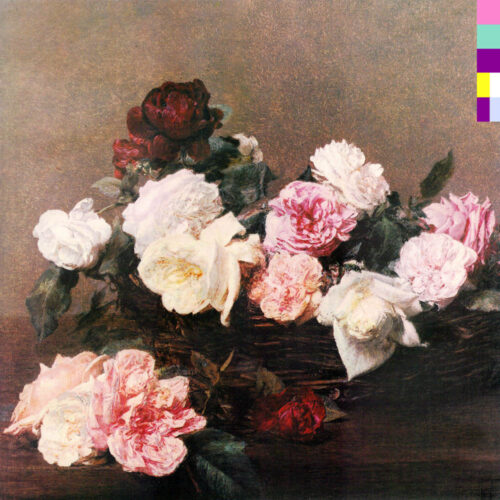It was some years ago, and I was sitting in my old apartment, enjoying a summer evening, cool breeze, sunset light still in the air and so forth – the type of thing that, if you’re lucky in Southern California, just happens. Nearby was an open-air mall that was designed for Gen Xers and has gently rolled with every tide since, being vaguely Millennial now. (Dumb stereotypes, sure, but again, its kind of businesses aim for whatever their supposed youth clientele might be.) A recent development were open-air concerts by various local bands – nothing remarkable, but occasionally I heard something that made me prick up my ears a bit. This was one of those times.
"Hang on, I know that bass line."
It was all slightly muffled – the band set-up was always facing away from the apartment building so we wouldn’t be completely blasted away, plus some trees provided intervening cover. There was something about the just giddy enough (but gentle) performance that caused me to listen in a little more closely; soon I realizing I was singing along a bit to what I was hearing. It all clicked when the chorus kicked in. "And I’m not the kind that likes to tell you just what I want to do."
New Order, ‘Age of Consent’, of course, I thought to myself. Never did find out who the band was who had in my view the good sense to cover something both perfectly catchy and a little obscure. The song was also suited for a place and location that on the face of it had very little to do with Manchester, the perceived grey gloom of post-punk and an album called Power, Corruption & Lies that’s now reached 30-years-old. But I remember being impressed – obviously in a smug, knowing way, sure, the kind of reaction such an occurrence can too easily produce. But the band didn’t sound old, or at least their lead singer didn’t, and if none of them were born when the song was originally written and recorded, that just made it feel all the better as a result.
For all that it isn’t in strictest terms, Power, Corruption & Lies is, in some ways, the first real New Order album, and probably nobody involved would deny it. Movement is Movement, certainly, and I’ve since come to appreciate its status as self-contained conclusion of a phase and time. Martin Hannett behind the decks one last time, a radically changed band already two albums and numerous singles deep having to find a new way forward but unsure fully yet what that would be, not when just about everyone in it had some sort of lead or prominent vocal aside from Stephen Morris.
But by the time Power, Corruption & Lies came out, New Order had finally done what Joy Division hadn’t – visited America, played in New York – not to mention doing exactly what Joy Division had done, score a club hit, and this time in their own right with ‘Blue Monday’ instead of due to the mediation of Grace Jones. They had breathed a little, let the sun in a little, danced a little more overtly than before… just a little, maybe. But it was enough, and they moved from black and white to more colour in turn. And it worked wonders, even with an album title that seems to suggest nothing more than negative extremity. (Michael Gira has probably wished more than once he could have adopted the phrase as an album title himself).
If the personal is political, or at least if slogans exist as glib canards to be referred to later, then Power, Corruption & Lies is all about its subject in many ways. It’s a brighter album, perhaps, but it’s not happy, unless your sense of revelry lies in compulsion and aversion. There are three immediately obvious examples. The first is the martial moodiness and obscure imagery of ‘We All Stand’, set against a slow loping rhythm underscored by doom-tinged piano. The second is the threat and tension in ‘Ultraviolence’ from the title on down, the relentless pulse and breath of the stabbing drums and skittering guitar parts backing the near duet of voice and bass, the former singing at one point "Everybody makes mistakes…even me…" And the third is the twisted tones and crawl of ‘5 8 6’ mutating into a new incarnation of ‘Blue Monday’; which was itself only two months old in the public mind at that point. The track may well jettison the dark declamations of that song for a chirpier vocal that still begins, "I hear danger, danger, danger!"
Still, by the time of the concluding breakdown, things are less dramatic, less alienating and crushing than its utterly monumental forebear. There is more of a gentle easing back of the throttle with the synths – one of many moments where Gillian Gilbert makes her instrumental voice via keyboard known, as crucial a part to the whole as the rest – which become soothing addition instead of piercing klaxon.
There’s a strangely cheery energy to the album as well. This is something that would be a hallmark of the intertwined dance that New Order and The Cure would perform over the next couple of years. This was to the extent that it sometimes seemed the distinguishing factor of a song wouldn’t emerge fully until it was clear if the singer was Bernard Sumner or Robert Smith. However The Cure always possessed the sense of a singular voice going through eternal moods of structure and collapse in equal measure, wooziness and queasy pirouetting. Whereas by this point the rigorous structure of what was New Order remained crucial, especially that sense of being something not too far removed from Can, Kraftwerk and other Teutonic proponents of total focus. And now this sound was more openly underscored by the electronic disco rigour that continued to flourish worldwide.
Elsewhere ‘The Village’ is downright winsome. Sumner talk/sings about love like the flowers, the rain, the sea, and the hours, everything is locked into a rushed, focused punch and pulse. It’s still not quite them in their dancing days, even though they’d just come off the release of ‘Blue Monday’. ‘Confusion’ was just around the corner to revamp things yet again. Instead ‘The Village’ has a friendliness with its subject that makes total sense, electronic bass that is just as notable as Peter Hook’s essential signature sound.
Sumner as voice of the album stands out throughout, often lighter in tone, more assured in singing, than ever before. Add that brisk feeling from so many songs – the musical promise of ‘Love Will Tear Us Apart’ now fully, comfortably reincorporated and extended – and there’s a sense of motion from stark European futurism towards, perhaps, something of a reworked English romanticism. Certainly the cover art suggests this, with Peter Saville and Tony Wilson, famously reclaiming the English people’s art (however French the actual artist), for the English people.
Flowers and computer code aside, the whole album is, without overtly trying, swimming through depths to find light, discovering ways to continue resisting being caught forever in one sound. ‘Ecstasy’ in retrospective, is rather amazing – however much they already knew about MDMA, Madchester-as-stereotypical-thing was still some way away, and even then it wouldn’t stereotypically sound like this. But something coursed through the music here, the vocals were only treated bass sounds and distorted angelic whispers, it possessed a slippery flow of an arrangement which was energetic and bright while never quite resolving into sense.
‘Your Silent Face’ for a lot of people, still, is likely the heart of the album. The steady Kraftwerkisms are all over the place, Gilbert’s electronic orchestrations perfectly simple and throat-catching, a melodica exploring space and melody just as beautifully as on any prime Augustus Pablo single. Sumner’s ruminations are cryptic at best but all the more suggestive for it. Hook’s bass becomes a new lead for Sumner’s guitars to wrap themselves around. Morris becomes the fully electronic beat box human, turning all those complaints – ALL those idiot complaints – about the supposed soullessness of electronic music into so much grunting hash from whining fools. Then right when there might be some sort of clear lyrical breakout moment:
"You’ve caught me at a bad time/ So why don’t you piss off?"
It all melts into yet another synth mood-out, the melodica returns in as deft a moment of drama as any that can be imagined. It introduces a fleeting sense of chagrin or embarrassment before everything comes flooding back together all at once, seeing out the song steadily and just so.
But maybe it’s almost too perfect, so perhaps the real heart comes at the end. Sumner (or his narrative voice) opened the album confessing that he doesn’t necessarily want to have to say what his desires are. This is an apt statement from the singer for a band who hadn’t even wanted the job. But then he has to spend an entire album – for the first time ever – teasing a lot of things out song for song, however guardedly, however flippantly, however metaphorically. So why not write a song revolving around an image of lonely souls on deserted islands, except avoiding the kind of approach that the Police had dealt with a few years previously on ‘Message In A Bottle’ say. So Sumner, who heard so much desire for connection from Ian Curtis, came up with a much better lyric than Sting ever could. And he did it in a less mannered fashion, in a way that actually didn’t want to resolve into easy romantic sentiment, on ‘Leave Me Alone’.
"On a thousand islands in the sea
I see a thousand people just like me
A hundred unions in the snow
I watch them walking, falling in a row
We live always underground
It’s going to be so quiet in here tonight
A thousand islands in the sea
It’s a shame."
It’s a celebration of potential partnership and attendant miscommunication, of getting the words wrong but smiling in return, and then asking – not demanding – simply to be left alone. It’s a celebration above all else of the theme running throughout the entire album, to the fore on ‘Age Of Consent’, ‘Your Silent Face’ and here: introversion. It’s a response – however supposedly artless or brusque at times – to a world confusing to those who may only just want to reflect, observe and think rather than engage. Sometimes the islands in the sea are cheerfully inhabited by just one soul.
And ‘Leave Me Alone’ works exquisitely as an album ender because all those moments of rigour in the rhythm and cheer in the guitars all come together, that bass still underpinning everything, and sending it all off with a surge. If this closing track is not a smile, it’s something that still feels like a deep breath inhaled, so the world can be dealt with on its own terms. It would have made a suitable cover version for some unknown local band in the late summer sun just as nicely as ‘Age Of Consent’ did. It has its own lyric concerned with not always wanting to say what’s on one’s mind, with music just as immediate, with its own tension between warmth and easily expressed power, but moving beyond corruption per se and uninterested in telling lies. For all the unstated tensions, the deep moods, it’s an album for those who are happy both when the sun sets and because there’s a sun to start with.



